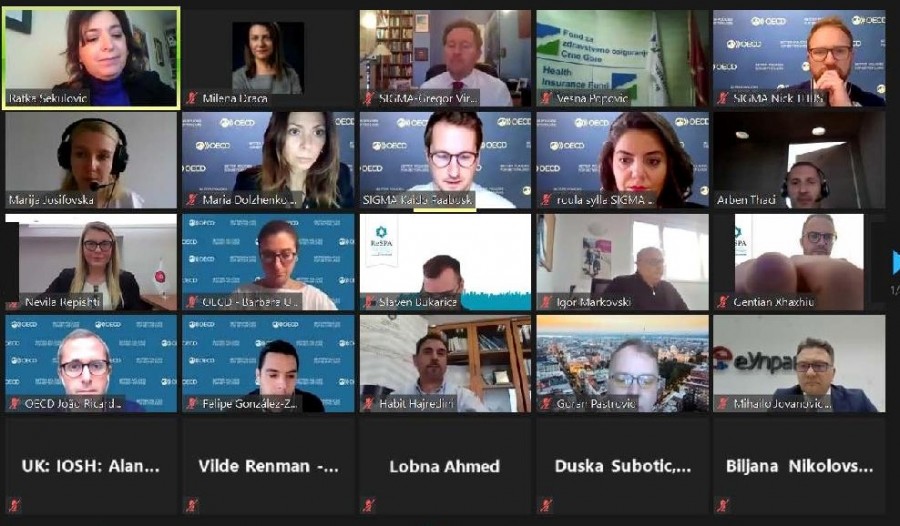
WB PA Awards 2020 champions promoted the innovative digital approaches at the "Government After Shock" global event
Jointly with OECD/SIGMA, ReSPA hosted the "Think fast…act faster" Panel as a part of the Government After Shock online event coordinated by the OECD's Observatory of Public Sector Innovation (OPSI) on Tuesday, 17 November 2020.
The Panel gathered more than 100 participants and was an ideal occasion for the promotion of one of the most successful winning cases of the just-finished Western Balkans Public Administration Awards contest.
During the welcoming words, Ms Ratka Sekulović, ReSPA Director, pointed out that this event and three winning cases which are best of the best of the PA Awards contest is great confirmation that WB administrations can be innovative and fastly adapted to the crises such as this one caused by the Covid-19 pandemic.
Ms Barbara Ubaldi, Head of the digital government and data unit at OECD, presented the role of digital governance in the Covid-19 pandemic, focusing on digital and innovative government approaches which have helped countries take actions to improve people's lives across the whole of society by switching from reactive to the proactive role.
Innovative digital government responses in the Western Balkans
Mr Mihailo Jovanović, Director of the Office for IT and eGovernment, Republic of Serbia, elaborated on how Serbia's e-Government response to the crisis was innovative and efficient by presenting several innovative projects such as e-enrollment in kindergartens and pre-school institutions, budivolonter.gov.rs - an online platform for volunteers, enrollment in secondary schools which shifted online, electronic primary-school enrolment, Viber community "My school" with more than 100.000 members, etc.
Ms Nevila Repishti, Head of the Governmental Portal e-Albania Department, National Agency of Information Society, presented e-Albania governmental platform which provided services restricting citizen movement by providing planned permissions for businesses' employees and citizens to leave their houses.
Vesna Popović, Adviser to the Director of the Health Insurance Fund Montenegro, explained how successful Montenegrin government's response to the crisis in the field of the health was. Their e-health portal is a comprehensive and complex project which involved more than 250 health institutions such are Health Insurance Fund, Public pharmacy "Montefarm", Primary health care, secondary health care, Institute for Emergency Medical Aid, Blod Transfusion Institute Montenegro, Private dental clinics and pharmacies, hospitals and others. The digital services have had a significant effect in terms of reducing the number of contacts between medical staff and patients
Mr Nick Thijs, Senior Advisor OECD/SIGMA Programme, moderated this session.
Panel discussion on the lessons learnt and conclusions for the future
The panel discussion on the lessons learnt and conclusions for the future gathered eminent speakers: Mr Mihailo Jovanović, Ms Nevila Repishti, Ms Barbara Ubaldi, Ms Vesna Popović, and Florian Hauser, Team Leader, Centre of Thematic Expertise on Public Administration Reform, European Commission/DG NEAR who emphasized that presented cases from the Western Balkans proved that are much more advanced than many others in EU countries.
Mr Gregor Virant, Head of OECD/SIGMA Programme, moderated this vivid panel discussion.
Mr Goran Paštrović, ReSPA Expert, wrapped-up and closed the Panel.
Government After Shock aims to support each country's capacity to anticipate, understand, and govern complex and changing circumstances caused by the COVID-19 pandemic, while simultaneously promoting international collaboration.



